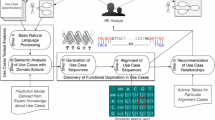Abstract
The requirements for a system are often specified as textual use cases. Although they are written in natural language, the simple and uniform sentence structure used makes automated processing of use cases feasible. However, the numerous use case approaches vary in the permitted complexity and variations of sentence structure. Frequently, use cases are written in the form of compound sentences describing several actions. While there are methods for analyzing use cases following the very simple SVDPI (subject-verb-direct object ... indirect object) pattern, methods for more complex sentences are still needed. We propose a new method for processing textual requirements based on the scheme earlier described in [13]. The new method allows to process the commonly used complex sentence structures, obtaining more descriptive behavior specifications, which may be used to verify and validate requirements and to derive the initial design of the system.
This work was partially supported by the Grant Agency of the Czech Republic project 201/06/0770 and by the HighQSoftD project funded by the Macao Science and Technology Development Fund.
Access this chapter
Tax calculation will be finalised at checkout
Purchases are for personal use only
Preview
Unable to display preview. Download preview PDF.
Similar content being viewed by others
References
Blaheta, D., Charniak, E.: Assigning Function Tags to Parsed Text. In: Proceedings of the 1st Annual Meeting of the North American Chapter of Association for Computational Linguistic, vol. 2, pp. 234–240 (2000)
Cockburn, A.: Writing Effective Use Cases, 1st edn. Addison-Wesley, Reading (2000)
Collins, M.: A New Statistical Parser Based on Bigram Lexical Dependencies. In: Proceedings of ACL 1996, University of California, Santa Cruz, CA, USA, pp. 184–191. Morgan Kaufmann Publishers, San Francisco (1996)
Drazan, J.: Natural Language Processing of Textual Use Cases. Master’s Thesis, Advisor: Vladimir Mencl, Charles University (Feb. 2006)
Fantechi, A., Gnesi, S., Lami, G., Maccari, A.: Application of Linguistic Techniques for Use Case Analysis. In: Proceedings of RE 2002, Essen, Germany, pp. 157–164. IEEE CS, Los Alamitos (2002)
Fiedler, M., Francu, J., Ondrusek, J., Plsek, A.: Procasor Environment: Interactive Environment for Requirement Specification. Student Software Project, Supervisor: Mencl, V., Charles University (September 2005), http://nenya.ms.mff.cuni.cz/~mencl/procasor-env/
Graham, I.: Object-Oriented Methods: Principles and Practice, 3rd edn. Addison-Wesley, Reading (2000)
Henderson, J.C., Brill, E.: Exploiting Diversity in Natural Language Processing: Combining Parsers. In: Proceedings of the Fourth Conference on Empirical Methods in Natural Language Processing (EMNLP-99), College Park, Maryland, USA, pp. 187–194 (June 1999)
Larman, C.: Applying UML and Patterns: An Introduction to Object-Oriented Analysis and Design and the Unified Process, 2nd edn. Prentice Hall, Englewood Cliffs (2001)
Liu, D., Subramaniam, K., Eberlein, A., Far, B.H.: Automating Transition from Use-Cases to Class Model. In: IEEE Canadian Conference on Electrical and Computer Engineering, CCECE 2003 (May 2003)
Liu, D., Subramaniam, K., Eberlein, A., Far, B.H.: Natural Language Requirements Analysis and Class Model Generation Using UCDA. In: Orchard, B., Yang, C., Ali, M. (eds.) IEA/AIE 2004. LNCS (LNAI), vol. 3029, pp. 295–304. Springer, Heidelberg (2004)
MacDonell, S.G., Min, K., Connor, A.M.: Autonomous Requirements Specification Processing using Natural Language Processing. In: Proceedings of the 14th International Conference on Adaptive Systems and Software Engineering, IASSE05 (2005)
Mencl, V.: Deriving Behavior Specifications from Textual Use Cases. In: Proceedings of Workshop on Intelligent Technologies for Software Engineering (WITSE04, Part of ASE 2004), Linz, Austria, Oesterreichische Computer Gesellschaft (Sep. 2004)
Mencl, V.: Use Cases: Behavior Assembly, Behavior Composition and Reasoning. Ph.D. Thesis, Advisor: Frantisek Plasil (June 2004)
Osborne, M., MacNish, C.K.: Processing Natural Language Software Requirement Specifications. In: Proceedings of ICRE’96, Colorado Springs, pp. 229–237. IEEE CS, Los Alamitos (1996)
Plasil, F., Mencl, V.: Getting “Whole Picture” Behavior in a Use Case Model. Transactions of SDPS: Journal of Integrated Design and Process Science 7, 63–79 (2003)
Plasil, F., Mencl, V.: Use Cases: Assembling “Whole Picture Behavior”. TR 02/11, Dept. of Computer Science, University of New Hampshire, Durham (2002)
Plasil, F., Visnovsky, S.: Behavior Protocols for Software Components. IEEE Transactions on Software Engineering 28(11) (2002)
Rational Software Corporation (IBM), Rational Unified Process, version 2003.06.01.06 (2003), http://www-130.ibm.com/developerworks/rational/products/rup/
Richards, D.: Merging Individual Conceptual Models of Requirements. Requir. Eng. 4, 195–205 (2003)
Richards, D., Böttger, K., Aguilera, O.: A Controlled Language to Assist Conversion of Use Case Descriptions into Concept Lattices. In: McKay, B., Slaney, J.K. (eds.) Canadian AI 2002. LNCS (LNAI), vol. 2557, pp. 1–11. Springer, Heidelberg (2002)
Schneider, G.: Extracting and Using Trace-Free Functional Dependencies from the Penn Treebank to Reduce Parsing Complexity. In: Proceedings of Treebanks and Linguistic Theories (TLT) 2003, Växjö, Sweden, Växjö, pp. 153–164. University Press, New Haven (2003)
Stevenson, M.: Extracting Syntactic Relations using Heuristics. In: ESSLLI98 - Workshop on Automated Acquisition of Syntax and Parsing, pp. 248–256 (1998)
Author information
Authors and Affiliations
Editor information
Rights and permissions
Copyright information
© 2007 Springer Berlin Heidelberg
About this paper
Cite this paper
Drazan, J., Mencl, V. (2007). Improved Processing of Textual Use Cases: Deriving Behavior Specifications. In: van Leeuwen, J., Italiano, G.F., van der Hoek, W., Meinel, C., Sack, H., Plášil, F. (eds) SOFSEM 2007: Theory and Practice of Computer Science. SOFSEM 2007. Lecture Notes in Computer Science, vol 4362. Springer, Berlin, Heidelberg. https://doi.org/10.1007/978-3-540-69507-3_74
Download citation
DOI: https://doi.org/10.1007/978-3-540-69507-3_74
Publisher Name: Springer, Berlin, Heidelberg
Print ISBN: 978-3-540-69506-6
Online ISBN: 978-3-540-69507-3
eBook Packages: Computer ScienceComputer Science (R0)




